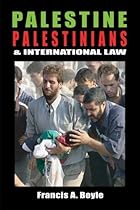Read PALESTINE, PALESTINIANS & INTERNATIONAL by Francis A. Boyle Online
Read [Francis A. Boyle Book] ! PALESTINE, PALESTINIANS & INTERNATIONAL Online ! PDF eBook or Kindle ePUB free. PALESTINE, PALESTINIANS & INTERNATIONAL A good view on the crisis based on international law The previous reviewer shows their obvious bias toward Israel. This book is basically giving by international legal standards, what palestinians have a right to due to the course of law and what the israeli government has not allowed them to achieve. Noam Chomsky said it best when he defined the hypocrite as refusing to apply to themselves the same standards it applies to others. If its wrong for one country it should be wrong for other countri

| Title | : | PALESTINE, PALESTINIANS & INTERNATIONAL |
| Author | : | |
| Rating | : | 4.62 (783 Votes) |
| Asin | : | 093286337X |
| Format Type | : | paperback |
| Number of Pages | : | 100 Pages |
| Publish Date | : | 2014-09-15 |
| Language | : | English |
"Boyle’s penetrating analyses of Israeli and American roles are as cogent as his criticisms are fearless" -- Washington Report on Middle East Affairs"This book provides a comprehensive legal analysis for the Palestinian right to an independent state." -- Mediterranean Journal of Human Rights"This book provides important background to how the ICJ reached its conclusions, and some interesting hints about the likely consequences." -- Middle East International"a valuable historical (and legal) record for those analyzing Palestinian decision-making in the late 1980s and early 1990s." -- Journal of Palestine Studies"must reading for all those interested in the legal background of the Palestinian-Israeli conflict." -- Arab Studies Quarterly
Francis Anthony Boyle is Professor of International Law at the University of Illinois. A highly visible actor in the international arena, he has served as legal advisor to the Palestinian Delegates in the Middle East peace negotiations, as well as to Bosnian President Alija Izetbegovic. Boyle is the author of numerous books, including
A leading US expert applies the norms and standards of international law to the Israeli/Palestinian conflict, addressing Palestinian statehood, the negotiation and failure of the Oslo Accords, the status of Jerusalem, the Al Aqsa Intifada, the right of return, human rights violations, war crimes, crimes against humanity, terrorism (both state and suicide bombings), the current divest-from-Israel campaign and the US war against Iraq.
A good view on the crisis based on international law The previous reviewer shows their obvious bias toward Israel. This book is basically giving by international legal standards, what palestinians have a right to due to the course of law and what the israeli government has not allowed them to achieve. Noam Chomsky said it best when he defined the hypocrite as refusing to apply to themselves the same standards it applies to others. If its wrong for one country it should be wrong for other countries. Israel just by looking at the Un security council resolutions from the early 1950s to the present, has violated far more resolutions than any country combined. Yet no sanctions or actions are p. "Fine assertion of Palestine's right to statehood" according to William Podmore. In international law, Palestine is an independent nation. Article 22(Fine assertion of Palestine's right to statehood William Podmore In international law, Palestine is an independent nation. Article 22(4) of the Covenant of the League of Nations (1919), the 1922 Mandate for Palestine and the Treaty of Lausanne (1923) recognised that all Arab territories of the former Ottoman provinces, including Palestine, were to be granted freedom as provisionally independent nations. As the Covenant asserted, "their existence as independent nations can be provisionally recognised." This was reaffirmed in the UN Charter, Article 80(1).What then is the root of the problem in the Middle East? On 7 October 2000 the Security Council adopted Resolution 1322 by 14 votes to nil, with the . ) of the Covenant of the League of Nations (1919), the 1922 Mandate for Palestine and the Treaty of Lausanne (192Fine assertion of Palestine's right to statehood In international law, Palestine is an independent nation. Article 22(Fine assertion of Palestine's right to statehood William Podmore In international law, Palestine is an independent nation. Article 22(4) of the Covenant of the League of Nations (1919), the 1922 Mandate for Palestine and the Treaty of Lausanne (1923) recognised that all Arab territories of the former Ottoman provinces, including Palestine, were to be granted freedom as provisionally independent nations. As the Covenant asserted, "their existence as independent nations can be provisionally recognised." This was reaffirmed in the UN Charter, Article 80(1).What then is the root of the problem in the Middle East? On 7 October 2000 the Security Council adopted Resolution 1322 by 14 votes to nil, with the . ) of the Covenant of the League of Nations (1919), the 1922 Mandate for Palestine and the Treaty of Lausanne (1923) recognised that all Arab territories of the former Ottoman provinces, including Palestine, were to be granted freedom as provisionally independent nations. As the Covenant asserted, "their existence as independent nations can be provisionally recognised." This was reaffirmed in the UN Charter, Article 80(1).What then is the root of the problem in the Middle East? On 7 October 2000 the Security Council adopted Resolution 1322 by 1Fine assertion of Palestine's right to statehood William Podmore In international law, Palestine is an independent nation. Article 22(4) of the Covenant of the League of Nations (1919), the 1922 Mandate for Palestine and the Treaty of Lausanne (1923) recognised that all Arab territories of the former Ottoman provinces, including Palestine, were to be granted freedom as provisionally independent nations. As the Covenant asserted, "their existence as independent nations can be provisionally recognised." This was reaffirmed in the UN Charter, Article 80(1).What then is the root of the problem in the Middle East? On 7 October 2000 the Security Council adopted Resolution 1322 by 14 votes to nil, with the . votes to nil, with the . ) recognised that all Arab territories of the former Ottoman provinces, including Palestine, were to be granted freedom as provisionally independent nations. As the Covenant asserted, "their existence as independent nations can be provisionally recognised." This was reaffirmed in the UN Charter, Article 80(1).What then is the root of the problem in the Middle East? On 7 October 2000 the Security Council adopted Resolution 1Fine assertion of Palestine's right to statehood In international law, Palestine is an independent nation. Article 22(Fine assertion of Palestine's right to statehood William Podmore In international law, Palestine is an independent nation. Article 22(4) of the Covenant of the League of Nations (1919), the 1922 Mandate for Palestine and the Treaty of Lausanne (1923) recognised that all Arab territories of the former Ottoman provinces, including Palestine, were to be granted freedom as provisionally independent nations. As the Covenant asserted, "their existence as independent nations can be provisionally recognised." This was reaffirmed in the UN Charter, Article 80(1).What then is the root of the problem in the Middle East? On 7 October 2000 the Security Council adopted Resolution 1322 by 14 votes to nil, with the . ) of the Covenant of the League of Nations (1919), the 1922 Mandate for Palestine and the Treaty of Lausanne (1923) recognised that all Arab territories of the former Ottoman provinces, including Palestine, were to be granted freedom as provisionally independent nations. As the Covenant asserted, "their existence as independent nations can be provisionally recognised." This was reaffirmed in the UN Charter, Article 80(1).What then is the root of the problem in the Middle East? On 7 October 2000 the Security Council adopted Resolution 1322 by 1Fine assertion of Palestine's right to statehood William Podmore In international law, Palestine is an independent nation. Article 22(4) of the Covenant of the League of Nations (1919), the 1922 Mandate for Palestine and the Treaty of Lausanne (1923) recognised that all Arab territories of the former Ottoman provinces, including Palestine, were to be granted freedom as provisionally independent nations. As the Covenant asserted, "their existence as independent nations can be provisionally recognised." This was reaffirmed in the UN Charter, Article 80(1).What then is the root of the problem in the Middle East? On 7 October 2000 the Security Council adopted Resolution 1322 by 14 votes to nil, with the . votes to nil, with the . 22 by 1Fine assertion of Palestine's right to statehood William Podmore In international law, Palestine is an independent nation. Article 22(4) of the Covenant of the League of Nations (1919), the 1922 Mandate for Palestine and the Treaty of Lausanne (1923) recognised that all Arab territories of the former Ottoman provinces, including Palestine, were to be granted freedom as provisionally independent nations. As the Covenant asserted, "their existence as independent nations can be provisionally recognised." This was reaffirmed in the UN Charter, Article 80(1).What then is the root of the problem in the Middle East? On 7 October 2000 the Security Council adopted Resolution 1322 by 14 votes to nil, with the . votes to nil, with the . Brilliant overview This is a brilliant overview of the legal framework of analysing the Israeli-Palestinian conflict, written for a lay audience.Boyle demonstrates that Palestine is legally a state - recognised by over 110 countries worldwide - and that since Israel has refused to recognise it, and has, in fact, trampled over its sovereign rights, it deserves to be suspended from the United Nations.Israel's entry into the UN, after all, was contingent on its adherence to UN Security Council Resolutions 181 and 19Brilliant overview Nathan East This is a brilliant overview of the legal framework of analysing the Israeli-Palestinian conflict, written for a lay audience.Boyle demonstrates that Palestine is legally a state - recognised by over 110 countries worldwide - and that since Israel has refused to recognise it, and has, in fact, trampled over its sovereign rights, it deserves to be suspended from the United Nations.Israel's entry into the UN, after all, was contingent on its adherence to UN Security Council Resolutions 181 and 194, which, fifty-seven years later, it has failed to implement. These constitute gross violations of international law, for which there must be le. , which, fifty-seven years later, it has failed to implement. These constitute gross violations of international law, for which there must be le
Download PALESTINE, PALESTINIANS & INTERNATIONAL
Download as PDF : Click Here
Download as DOC : Click Here
Download as RTF : Click Here
